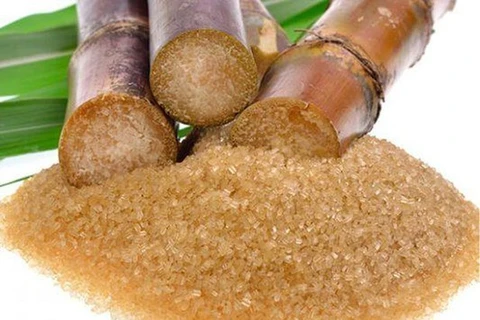Hanoi (VNA) - The application of trade remedies that match international commitments have helped protect domestic production from unfair competition, according to the Ministry of Industry and Trade (MoIT).
Talking with reporters, Chu Thang Trung, Deputy Director of the MoIT’s Trade Remedies Authority, called trade remedies an effective tool for manufacturing sectors to maintain their operations and grow in a fair competitive environment, created added values and contribute to national development.
Increasing trend of trade remedies
Reporter: In the first two months of this year, industrial production and export have declined. Is the pressure from trade remedy investigations into Vietnamese goods a reason behind the situation?
Mr. Chu Thang Trung: The decline in industrial production and export in the first two months is due to several reasons, with the main factors being the global economy experiencing a difficult period, slow recovery and falling demand; and the risk of economic recession, inflation, and high interest rates that lead to shrinking consumption in many countries worldwide, including those in Europe and America.
Besides, the conflict in Ukraine has pushed up prices of materials, energy and logistics services in the world, thus impacting production costs at home. Therefore, trade remedy investigations are not the reason behind the situation.
However, such economic difficulties would harm production in countries, prompting them to use more trade remedies to protect their domestic consumption, which has created double adverse impacts on both production and export of Vietnamese enterprises.
A trade remedy investigation often lasts from 12 to 18 months before such measures are officially put in place. Therefore, the Authority will maintain its close watch on the trend and continue analsysing it to take timely measures to help businesses deal with investigations by foreign countries effectively.
Reporter: How do you evaluate the trend of applying trade remedies by countries in the time ahead, especially in the markets with which we sign new free trade agreements (FTAs) such as CPTPP, EVFTA, UKVFTA and RCEP?
Mr. Chu Thang Trung: Vietnam has to date participated in 15 free trade agreements (FTAs), including several new-generation deals like the Comprehensive and Progressive Agreement for Trans-Pacific Partnership (CPTPP), the EU-Vietnam Free Trade Agreement (EVFTA), and the Regional Comprehensive Economic Partnership (RCEP). These deals provide businesses with tariff incentives, enhance market access, and bring competitive advantages to exports.
However, if export increases too rapidly, it would affect production in importing countries, prompting them to use trade remedies, which are permitted by the World Trade Organisation (WTO) and stipulated in various FTAs, to restrict imports.
Apart from the markets that have signed FTAs with Vietnam, exports to some others like the US, Turkey, Brazil, and Argentina may also be subject to trade remedies as they frequently employ such measures to protect their domestic production.
Notably, the number of anti-circumvention investigations concerning trade remedies against Vietnam is increasing, particularly in the US market, mainly due to importers suspecting that the investigated goods have failed to meet the "substantial transformation" conditions, meaning they lack significant added values.
Determining "substantial transformation" is a complex, contentious issue, depending on each specific product and regulation set by each importing country. Alongside the trend of production relocation and the development of regional value chains, this will remain an issue of concern for businesses in the coming time.
Reporter: How do you assess the role of trade remedies in protecting legal interests of Vietnamese businesses, especially in the domestic market?
Mr. Chu Thang Trung: The MoIT has so far initiated 25 trade remedy investigations and had 17 valid trade remedies. The investigated items are quite diverse, including metal products, chemicals-plastics, construction materials, and basic consumer goods. Among them, many are associated with the livelihood of farmers.
For example, the MoIT’s application of anti-dumping and anti-subsidy measures on imported cane sugar from Thailand has positively impacted the cane sugar industry, helping farmers sell out sugarcane and significantly raise their income from the plant. Many localities plan to expand the sugarcane farming area in the coming years. Additionally, the sugar supply and demand remain relatively stable, and though sugar prices have slightly increased, there has been no sharp surge.
Thanks to the reasonable trade defence measures that match international commitments, domestic manufacturing sectors have been protected against unfair competition practices, thus facilitating their development, job creation, and value addition to the economy.
From the consumer perspective, long-term trade remedies help the economy avoid complete dependence on imports, and ensure stability and better resilience against external impacts and shocks.
In many cases, applying trade remedies to basic materials also enhances Vietnam's ability to optimise commitments in the FTAs, while reducing the risk of anti-circumvention investigations by foreign countries.
Avoiding excessive focus on a market
Reporter: What are the responsibilities of State management agencies in supporting businesses to cope with and utilise trade defence instruments?
Mr. Chu Thang Trung: In the context of international economic integration, domestic manufacturing and export industries must continuously sharpen their competitiveness, and revamp production organisation methods to compete on an equal footing with imported goods right in the domestic market.
Additionally, the Trade Remedies Authority always closely monitors and carries out trade defence activities based on requirements of domestic manufacturing industries to prevent unfair competition from imported goods in line with international law and commitments.
Specifically, the Authority is implementing Decision No. 1659/QD-TTg dated October 2, 2021, by the Prime Minister, approving the project "Enhancing trade defence capacity in the context of Vietnam participating in new-generation free trade agreements,” focusing on activities to increase information and knowledge about trade remedies for domestic manufacturing industries.
The Authority will also collaborate with relevant associations and agencies to closely monitor the production and import situation to take timely, appropriate measures to protect legitimate rights and interests of domestic manufacturing sectors.
Regarding investigations, the Authority will continue conducting them publicly and transparently in accordance with legal regulations, ensuring that opinions of all relevant parties are considered, and that accurate conclusions are made to prevent unfair competition from imported goods.
Reporter: What are your recommendations in responding to and using trade remedies to protect legal interests of businesses?
Mr. Chu Thang Trung: In the context of global economic uncertainties and complex trade conflicts between economies, the trend of using trade remedies continues to increase in the world.
Apart from efforts by the Government and the MoIT, the settlement of trade remedy investigations into Vietnamese export items by foreign countries requires active and proactive participation of the business community.
Businesses strive to meet set standards to boost exports. (Photo: VietnamPlus)
To minimise negative impacts of trade remedies, Vietnam’s manufacturing and export industries, and businesses need to build export strategies that target market diversification, avoid excessive focus on a single market, enhance competition by improving product quality, and limiting price-based competition. They should also consider risks related to trade remedies while building their own production and business strategies, especially for exports, and equip themselves with fundamental knowledge about trade remedy laws.
At the same time, they should prepare resources to cope with potential trade remedy investigations, stay updated on information from the MoIT during the export process, observe rules of origin, refrain from engaging in origin frauds and circumventing trade remedies, cooperate with investigative authorities and closely coordinate with the MoIT in settling incidents.
Domestic manufacturing industries should thoroughly understand trade remedy regulations to utilise them, and safeguard their legitimate interests against unfair competition from imported goods.
In the context that conventional tariff measures tend to decrease gradually, trade remedies will be an effective tool to help manufacturing industries maintain and develop in a fair competitive environment, create added values, and contribute to national development./.
Thank you for your interview!

























